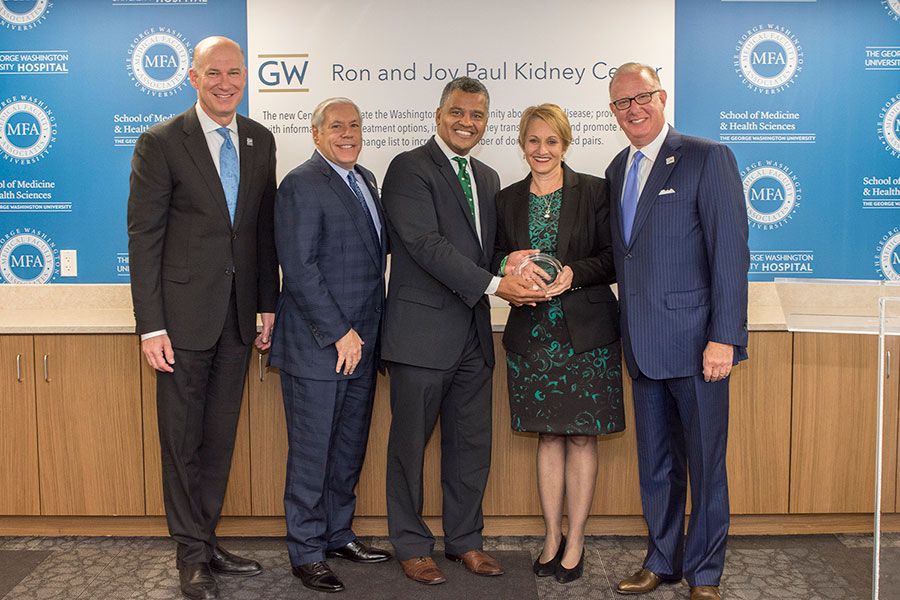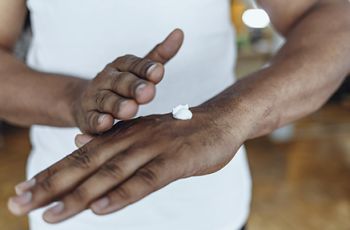
(This story originally appeared on GW Today).
When Carol Miller found out that she would need a kidney transplant, her husband volunteered to donate one of his organs to her. However, doctors ran tests and found that the pair was medically incompatible—which meant Ms. Miller would have to find another donor or add her name to one of the country’s long kidney waitlists.
Abdullah Al Ahmari faced a similar dilemma when doctors told him that his wife was not a good match for his kidney transplant.
A young man named Jordan Gray heard the same thing when he tried to donate an organ to his ailing mother.
That’s when the George Washington University Hospital began to work on its first-ever kidney exchange.
In what Director of GW Hospital’s Transplant Institute Keith Melancon called a “mix-and-match,” his team examined blood data and discovered that Ms. Miller’s husband was the perfect match for Mr. Al Ahmari. Ms. Miller ended up being compatible with Mr. Gray, and, to bring the exchange full-circle, Mr. Al Ahmari’s wife was the right donor for Mr. Gray’s mother.
The swap saved lives, and it exemplifies the kind of work that the D.C. community can expect from the Ron & Joy Paul Kidney Center, established by the GW School of Medicine and Health Sciences in concert with GW Hospital and the GW Medical Faculty Associates. A $2.5 million gift from the Ron & Joy Paul Family Foundation will ensure that more exchanges like these are possible while raising awareness about kidney disease in Washington.
At a celebration held at SMHS on Thursday, Mr. Al Ahmari, Ms. Miller and her husband and Mr. Gray met for the first time, trading hugs and brushing tears from their eyes. The event also honored Mr. and Mrs. Paul, and the work of doctors from SMHS and GW Hospital
“Embedded in the school’s strategic plan is a profound commitment to this community, in particular addressing health disparities in the District of Columbia,” said Jeffrey Akman, vice president for health affairs and dean of SMHS. “When two organizations or groups of people come together around a shared mission, we make beautiful music together.”
The statistics on kidney disease in Washington are startling. Barry Wolfman, the chief executive officer and managing director of GW Hospital, shared that more than 75 percent of people waiting for an organ transplant in D.C. need a kidney, and the city’s supply is not high enough to meet demands. In 2014, there were only 116 live kidney donors.
“Out of every crisis, opportunity presents itself, and this one is no different,” Mr. Wolfman said. “We thought there would be a tremendous opportunity for us to provide expert and comprehensive clinical care throughout the community.”
The event also featured brief remarks from D.C. Councilmember Jack Evans (D-Ward 2) and representatives from Mayor Muriel Bowser’s office, who lauded GW and Mr. and Mrs. Paul for their efforts.
Addressing kidney health is a personal issue for the Paul family. Mr. Paul, chair and co-founder of EagleBank, struggled with kidney disease when he was 27. He and his wife had just started a family and had applied for life insurance when he failed a routine urine test. Things escalated quickly: He would need a transplant.
“There were many tears, but we both knew we had to live on since those who know me know that slowing down is not an option,” he said.
Mr. Paul received a kidney from his brother that would last him 19 years. But soon, he needed a second transplant, showing how complicated kidney disease can be.
Dr. Melancon said multiple kidney transplants are common in patients. That’s why it’s important for doctors to treat the issue with particular creativity and dedication. He pointed out that in addition to a three-way kidney exchange, GW Hospital recently performed its first successful kidney transplant from a deceased donor.
“As you can see, there are wonderful synergies working together, and this is more of what we’re going to be doing in the future,” he said.
The work is hardly over for Mr. and Mrs. Paul. They have received an outpouring of calls from people waiting for kidney donations, and they want to make sure the newly opened center betters the lives of people in the D.C. community.
“I firmly believe that with the talent we have around this room and around the city, we can make a difference,” Mr. Paul said.
The GW School of Medicine and Health Sciences, GW Hospital, and the GW Medical Faculty Associates will host an event on Thurs, Nov. 5, to announce the Ron & Joy Paul Kidney Center.
October 28, 2015
- The GW Hatchet, 10/28: “Medical school launches kidney center with $2.5 million gift,” by Lillianna Byington
- GW Today, 10/28: “Kidney Center to Launch at GW Hospital”
- Washington Business Journal, 10/28: “D.C. hospital's new kidney program underscores CEO's strategy 'to do things no one else does,’” by Tina Reed
- Washington Business Journal, 10/28: “Ron Paul is donating millions to fight kidney disease,” by Andy Medici
- HealthLeaders Media (via Washington Business Journal), 10/29: “DC hospital's new kidney program underscores CEO's strategy 'to do things no one else does'”
- Bisnow, 11/3: “Business Leader Funds New Kidney Center,” by Tania Anderson
- The GW Hatchet, 11/4: “As kidney disease increases, kidney doctors decrease,” by Lila Weatherly
GW Ron & Joy Paul Kidney Center to Increase Live Kidney Donation in D.C.
The GW School of Medicine and Health Sciences, in concert with GW Hospital and the GW Medical Faculty Associates, has established the Ron & Joy Paul Kidney Center to raise awareness about kidney disease and increase live kidney donation in Washington, D.C.
November 5, 2015
- FOX5, 11/5: “New Kidney Center at GW Hospital”
- NBC4, 11/5: “New GW Kidney Center Opens, Exchange Donors and Recipients Meet for First Time”
- WUSA9, 11/5: “Kidney Recipients Meet Their Donors”
- Bisnow, 11/6: “Eaglebank CEO Ron Paul Opens New GW Kidney Center,” by Ethan Rothstein
- WTOP-FM, 11/6: “3-way transplant brings area families together,” by Paula Wolfson
- The GW Hatchet, 11/8: “New kidney center to increase treatment, research efforts,” by Lillianna Byington
- GW Today, 11/9: “GW’s Kidney Center Provides Health Solutions in Washington,” by Julyssa Lopez


